Where are the lesbian bars? Owners say they haven't died out – they're evolving into queer spaces.
Almost 30 years ago, Rachel Smallman would sneak away at night to The Sanctuary in Biloxi, Mississippi. It was 1994, she was in the Air Force and her husband was a preacher.
The local lesbian bar was one of the few places where she could be her authentic self.
But it soon shuttered, leaving Smallman without a place to go for about a decade. That's when she and her now-wife began driving through the South in search of lesbian bars. When they were kicked out of a gay bar in New Orleans in 2016 — where no women were allowed — the couple decided to open their own bar, Herz, in Mobile, Alabama.
"There were plenty of lesbian bars in Mobile when I was in my teen years," said Smallman, 46. "I'm the only one now."

There are just 21 "lesbian bars" left in the U.S., down from 200 in 1980, according to The Lesbian Bar Project's count. The awareness campaign supporting lesbian bars runs a website and released a documentary last summer.
Numerous bar owners who spoke to USA TODAY said many of the institutions they grew up with have since closed. But many also said lesbian bars aren't all dying out — they're changing.
A growing vocabulary to describe sexual orientation and gender is prompting some bars to reassess their terminology. Some are rebranding to appeal to a broader queer community and include those historically excluded from lesbian bars. Meanwhile, new bars, restaurants, cafes and pop-up events are also emerging to re-envision queer social life.
"There's just been a massive shift in the types of spaces that people need," said Gwen Shockey, founder of the Addresses Project, which documents lesbian and queer spaces in New York City. "And that doesn't always look like a lesbian bar anymore."
IT'S PRIDE MONTH: Read more Pride 2022 stories from USA TODAY
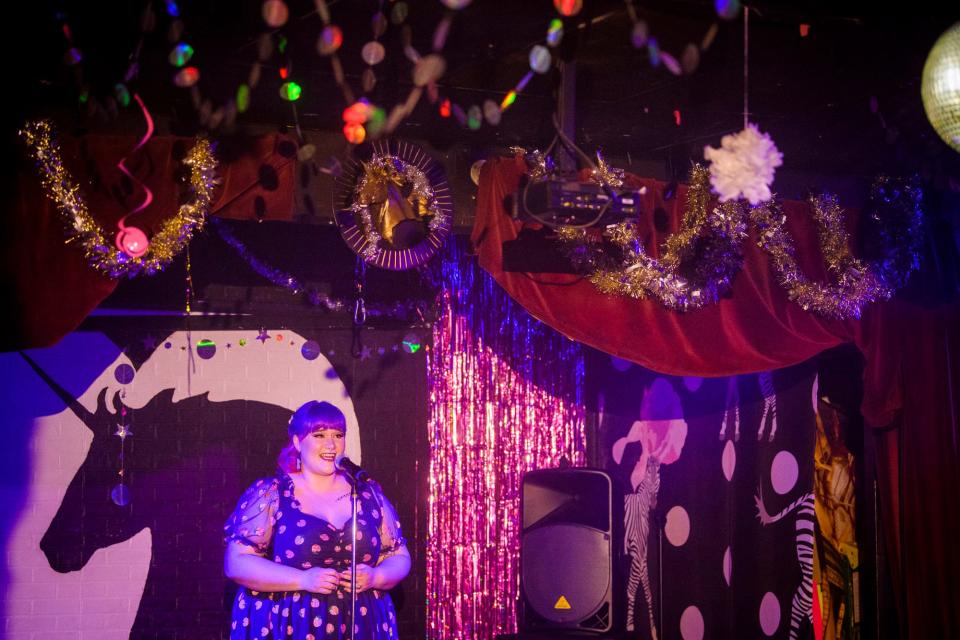
The history of lesbian bars
Gay bars first began appearing at the turn of the 20th century, but lesbian bars took longer to form due to societal and financial constraints on women, said Jaime Hartless, assistant professor at Farmingdale State College in New York. It wasn’t until after the World War II era, when more women began to enter the labor force, that lesbian bars started popping up.
As gay and lesbian rights movements gathered momentum in the 1960s, these bars were where activists networked and organized, Hartless said. Others didn’t see themselves as politically active, she added, only wanting a space "to exist and to drink a beer with their partner, not change the world."
"I needed somewhere to go meet women," said Audrey Corley, 47, owner of Boycott Bar in Phoenix. "I met the love of my life at my bar."
In the late 1970s and early 80s, women began to use the term "lesbian" because they felt the word "gay" largely referred to the experiences of cisgender, gay men rather than reflecting their own experiences, Hartless said. (Cisgender refers to people whose gender identity matches their assigned sex at birth.)
Women opening lesbian bars often did so because they didn’t feel safe, seen or served in gay bars, she said.

Smoove Gardner, 51, recalled going to a lesbian bar for the first time in Chicago. "I do remember it being magical," said Gardner, who now co-owns The Back Door in Bloomington, Indiana. "Just the relief of being like, I don't have to hide."
The 1970s saw an increase in lesbian bars nationwide, peaking around 1987 when there were over 200, said Greggor Mattson, a professor of sociology at Oberlin College who studies gay and lesbian bars. But after that year, "there was a crash in the number of lesbian bars."
Bar owners and historians offered various explanations. The gender pay gap, women having less disposable income and gentrification have put lesbian bars in a "more precarious" position than gay bars catering to gay men, Mattson said.
Others attribute the decline to the rise of dating apps and the growing acceptance of queer communities, generally.
Reclaiming a former slur from its history of hate: Is it OK to use the word queer?
Jenny Nguyen, 42, founder of The Sports Bra in Portland, Oregon, said every bar and restaurant in the city is "supposedly" queer-friendly. But it's still important to have spaces specifically for queer people, she said.
"In full acceptance, there is almost a lack of representation," Nguyen said.
The integration of queer and straight spaces has always been a "contentious goal" in the queer community, Hartless said.
"Is it the goal of the movement for all of us to be drinking our beers alongside straight people or is the goal of the movement to instead continue to develop our own internal cultures and our own communities?" Hartless said.
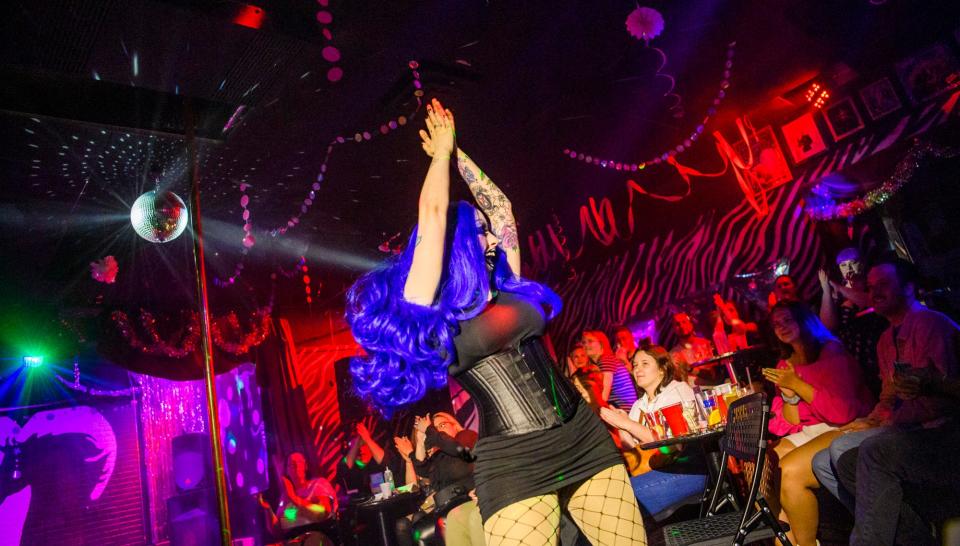
Ann Harris, 51, co-owner of Frankie's in Oklahoma City, noted that in red states like Oklahoma, bars specifically for queer communities are still "very necessary."
"Although I can go to a Red Lobster with my partner and eat and the company ... is all good with the fact that I'm there with my wife, our fellow patrons there in the restaurant, the rest of the Oklahomans, are not necessarily good with that," Harris said.
Corley said the bars she grew up going to in Arizona have since closed. She launched her own, Boycott, nearly two decades ago as "a dance party and upscale event for women" before opening the brick-and-mortar location five years ago.
Corley said her bar functions as a community hub — she's hosted three weddings, two engagements and one celebration of life at the bar. She runs local fundraisers and opens up every holiday, too.
"Bars are usually always more than just the bars, especially in the gay community, because so many people are not accepted in their families," she said.
RURAL AMERICA: Surge in Pride events helps LGBTQ folks find home
From 'lesbian bar' to 'queer bar'?
Bar owners said there's a generational divide among queer communities over the importance and meaning of the word "lesbian." While some said they hold tight to the label "lesbian bar" as a tribute to their roots, others say they're using new terminology to reflect the evolving LGBTQ community.
"When I hear lesbian bar, I think of my experience as a young queer person, figuring it out," said Jo McDaniel, co-owner of As You Are in Washington, D.C. "I shifted how I identify from lesbian to queer because I had romantic relationships with people who were not on the gender binary and do not identify as male or female."
There is "a really long history" of lesbian bars excluding transgender, nonbinary and bisexual people, said Japonica Brown-Saracino, professor of sociology and women, gender and sexuality studies at Boston University. As a result, there's a growing conversation about framing things in more inclusive terms, she said.
One famous bar in New York City has updated its descriptors over the years. Henrietta Hudson opened in 1991 as a "lesbian" space. In 2013, the bar relabeled as a "lesbian-centric Queer Human Bar." Last year, the bar reopened with a new logo "that is truly inclusive and representative of the space."
"We are a Queer Human Bar built by Lesbians," the bar wrote on Instagram, describing the change as an "evolution."
The decision proved controversial, and some people online said the bar was "no longer a lesbian-centered environment."
"That kind of burns a little bit to lose something that's just specifically for us," said Brittany Leach, 36, marketing director of Gossip Grill in San Diego. "But it doesn't make any sense to be hypocritical and not be inclusive to everyone who needs a safe space."
PRIDE 2022: How LGBTQ and female woodworkers are carving out space in a field built for men
Gossip Grill opened in 2009 as a lesbian restaurant, bar and nightclub and branded itself as being "female forward," Leach said. Staff now describe the business as "a women-forward LGBTQ+ safe space."
"I want to make sure that the lesbians don't feel like they're being abandoned. Because they aren't," Leach said. "We're just evolving. That's it. We're just getting stronger."

Bobbi Moore, 44, general manager of Slammers in Columbus, Ohio, said the bar keeps the "lesbian" label as a nod to the lesbian who opened it in 1993. "Thirty years ago, you really had to define yourself because you'd fought so hard for that label," Moore said.
But not all of the bars included on The Lesbian Bar Project's list describe themselves as "lesbian" spaces.
Frankie's in Oklahoma City doesn't call itself a lesbian bar, even though it's known as one in the community, Harris said. She and her wife say they picked the name four years ago because it "wasn't gender-specific."
The Back Door in Bloomington is a "queer space," Gardner said. They said the space was likely included on The Lesbian Bar Project's list because there's a common feminist energy that defines historically lesbian bars and newer spaces run by queer women.
"They share that welcoming attitude. They share that sense of community and giving back and educating," Gardner said. "That kind of thing has always meant more to us than making money. We've never been good capitalists."
As Leach said: "Some might think we just serve French fries and beer. But we actually serve forward-thinking movements and equal rights."
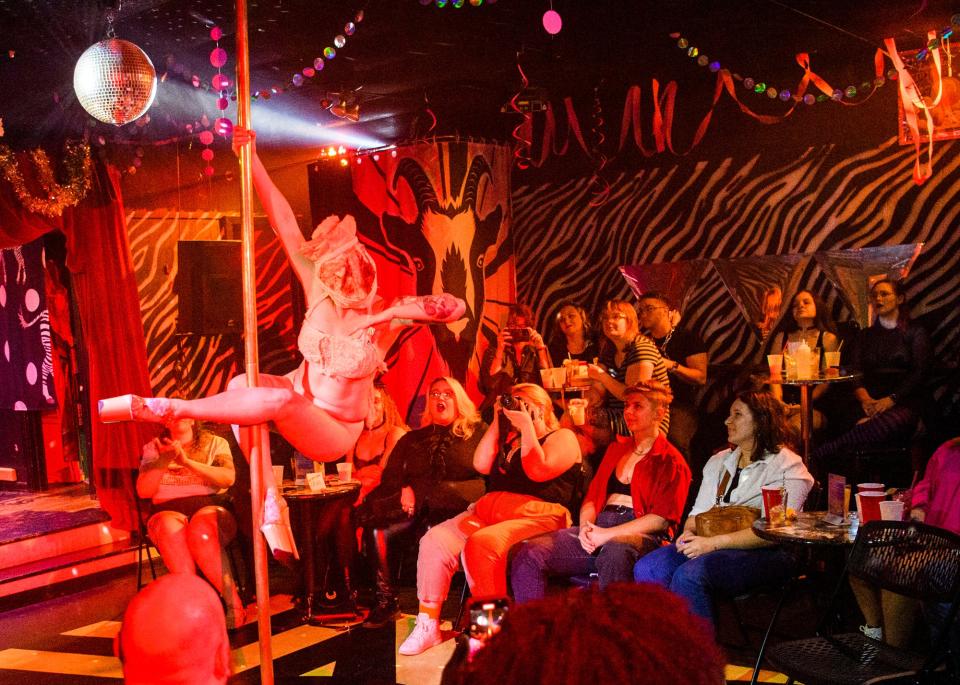
New spaces, pop-ups
Owners of several new spaces with ties to historically lesbian bars say they're trying to better serve the needs of their communities by going beyond changes in branding to adjust what they offer, and how.
There's "a shifting of queer spaces" toward creating more intersectional and accessible environments for people of all identities, ages and abilities, said Rach Pike. Pike, 37, and McDaniel, 40,, recently left their jobs at Washington's A League of Her Own to launch "a queer safe space and community hub" in the city.
The couple initially named the business "As You Are Bar" but later dropped the "bar" in an effort to de-center alcohol. The space has a coffeehouse downstairs and dance floor upstairs and hosts a cornhole league, bingo, karaoke, storytelling events and more.
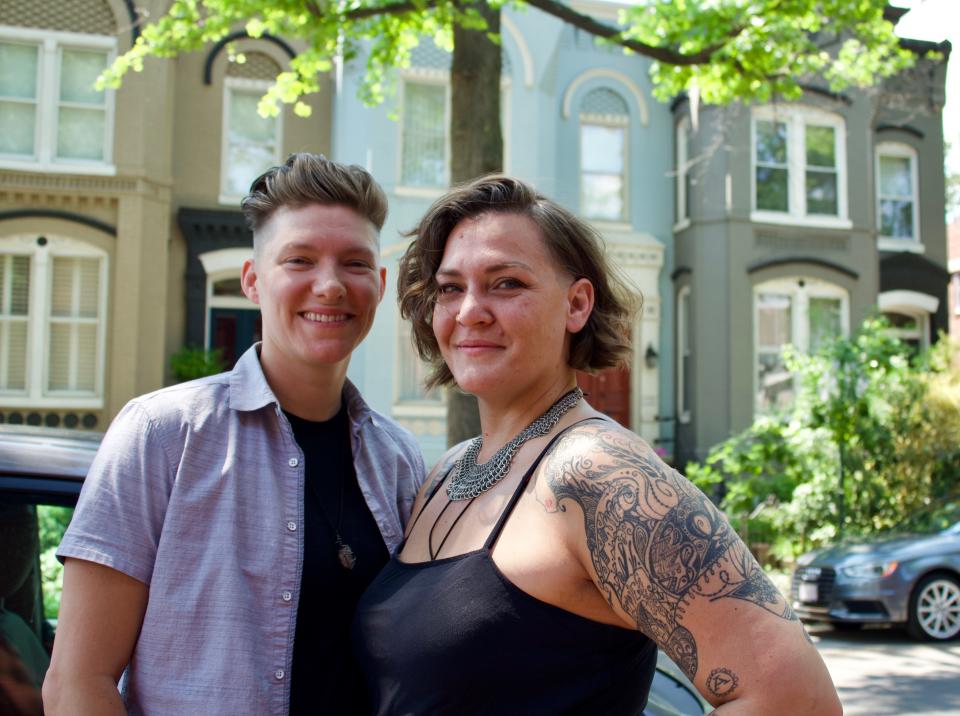
McDaniel frames the business approach as "queering the gay bar agenda." While some gay bars cater to the "monied, cis, often white, gay man," McDaniel said, As You Are aims to serve a much larger community, including the city's deaf queer population. All spoken events feature an American Sign Language interpreter.
Similarly, Leach recently helped launch Barrel & Board across the street from Gossip Grill as "a classier, leveled-up gathering space for queer women."
"I don't want to go to a nightclub anymore. I want to go and have a really nice dinner with nice wine but do it in a queer women space, which didn't exist," Leach said. "So that's what we built."
Meanwhile, other queer spaces are moving online or running in-person pop-up events, such as Dave's Lesbian Bar in Queens, New York, and Hot Donna's Clubhouse in Los Angeles. Past pop-ups have featured activities like tattooing and drag king brunches.
"We are growing into what it means to be a member of the lesbian community," said Lauren Richer, 33, founder of Hot Donna's Clubhouse, who is exploring options for a permanent brick-and-mortar location.
Erica Rose, filmmaker with The Lesbian Bar Project, said she's hopeful the U.S. is seeing the start of a resurgence of lesbian bars coming out of the COVID-19 pandemic. Since the project published its initial list of 21 bars last year, three more have opened, she said.
Back in Mobile, Alabama, Smallman said it's the bars that evolve that will survive. She said Herz has been celebrating Pride Month with customers of a range of identities, including lesbian, bisexual, pansexual and more.
"People have changed, so we have to change," Smallman said.
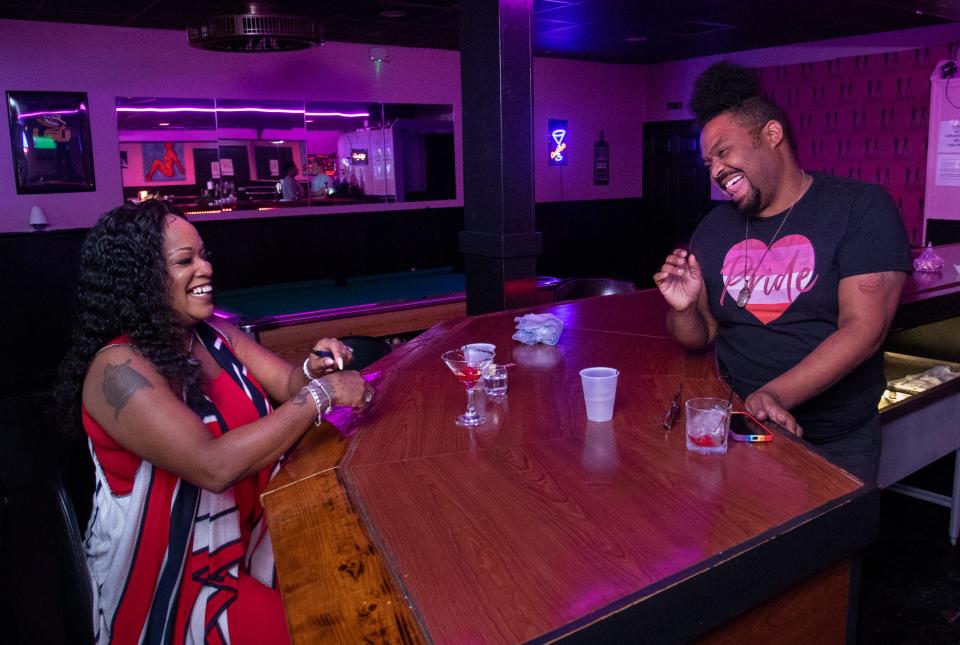
Follow Grace Hauck and Christine Fernando on Twitter at @grace_hauck and @christinetfern. Reach them via email at ghauck@usatoday.com and cfernando@usatoday.com.
More Pride 2022 stories from USA TODAY
Why do so many Gen Zers identify as LGBTQ? Because of the sacrifices of prior generations, experts say
'An out gay woman': Karine Jean-Pierre hopes to empower LGBTQ youth as White House press secretary
ey gave birth and love their children. And they want to remind you 'not all pregnant people are women.'
This article originally appeared on USA TODAY: Lesbian bars have closed but are evolving into queer spaces

 Yahoo Movies
Yahoo Movies 
